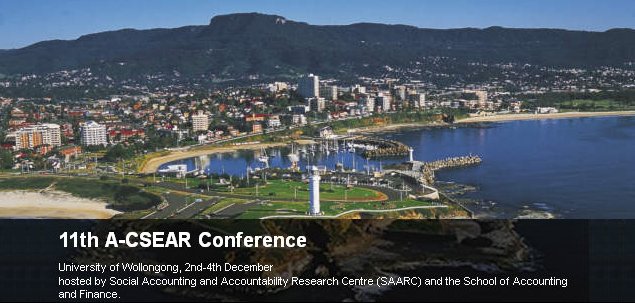Location
Bld 67.202
Start Date
4-12-2012 9:30 AM
End Date
4-12-2012 10:00 AM
Description
As a practice, accounting has a sustained public image as a neutral communicative technology that is designed to objectively reflect underlying financial ‘realities’. Despite attempts by critical accounting researchers to challenge this image and to highlight the strategic power of accounting it has continued to provide a rationality that remains substantially unchallenged when mobilised within public policy debates. Accounting has a powerful presence within public policy discussions and is now largely accepted as the central framework within which policy should be formed. In order to explore the role of accounting information public policy and more particularly within policy discussions around the privatisation of public services, this paper focuses on the role of ‘costs’ in the prison privatisation decisions the NSW government made during the course of 2009. During the course of 2009, the NSW government attempted to privatise two prisons. It was claimed that these prisons were ‘costing’ too much in the wake of the global financial crisis. However, after the ensuing debate, it was decided that only one should be privatised. We argue that considerations of cost underpinned both the decision to privatise and the decision not to privatise. Furthermore, much of the opposition to prison privatisation was couched in terms of its economic ‘cost’. This, we contend, highlights the hegemony currently achieved by the ‘cost-frame’, and of accounting discourse within public policy more generally.
Accounting, Public Policy, and the Hegemony of 'Cost': The Framing of Prison Privatisation in NSW
Bld 67.202
As a practice, accounting has a sustained public image as a neutral communicative technology that is designed to objectively reflect underlying financial ‘realities’. Despite attempts by critical accounting researchers to challenge this image and to highlight the strategic power of accounting it has continued to provide a rationality that remains substantially unchallenged when mobilised within public policy debates. Accounting has a powerful presence within public policy discussions and is now largely accepted as the central framework within which policy should be formed. In order to explore the role of accounting information public policy and more particularly within policy discussions around the privatisation of public services, this paper focuses on the role of ‘costs’ in the prison privatisation decisions the NSW government made during the course of 2009. During the course of 2009, the NSW government attempted to privatise two prisons. It was claimed that these prisons were ‘costing’ too much in the wake of the global financial crisis. However, after the ensuing debate, it was decided that only one should be privatised. We argue that considerations of cost underpinned both the decision to privatise and the decision not to privatise. Furthermore, much of the opposition to prison privatisation was couched in terms of its economic ‘cost’. This, we contend, highlights the hegemony currently achieved by the ‘cost-frame’, and of accounting discourse within public policy more generally.


